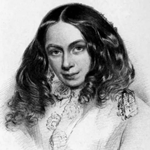 Elizabeth Barrett Browning (1806-1861) was one of the most prominent and popular poets of the Victorian era. She was the wife of poet Robert Browning, who she married in 1846 despite bitter objections by her father. Her famous poem, Sonnets from the Portuguese (1850), was written during her courtship with Browning. She resisted having such personal writings published, but relented at her husband’s urgings, and only under the condition that her name not appear on them. He called her “my little Portuguese” because of her dark coloring, and the name was used to mask her identity.
Elizabeth Barrett Browning (1806-1861) was one of the most prominent and popular poets of the Victorian era. She was the wife of poet Robert Browning, who she married in 1846 despite bitter objections by her father. Her famous poem, Sonnets from the Portuguese (1850), was written during her courtship with Browning. She resisted having such personal writings published, but relented at her husband’s urgings, and only under the condition that her name not appear on them. He called her “my little Portuguese” because of her dark coloring, and the name was used to mask her identity.
The Lady’s Yes
“Yes!” I answered you last night;
“No!” this morning, Sir, I say!
Colours, seen by candle-light,
Will not look the same by day.
When the tabors played their best,
Lamps above, and laughs below—
Love me sounded like a jest,
Fit for Yes or fit for No!
Call me false, or call me free—
Vow, whatever light may shine,
No man on your face shall see
Any grief for change on mine.
Yet the sin is on us both—
Time to dance is not to woo—
Wooer light makes fickle troth—
Scorn of me recoils on you!
Learn to win a lady’s faith
Nobly, as the thing is high;
Bravely, as for life and death—
With a loyal gravity.
Lead her from the festive boards,
Point her to the starry skies,
Guard her, by your truthful words,
Pure from courtship’s flatteries.
By your truth she shall be true—
Ever true, as wives of yore—
And her Yes, once said to you,
SHALL be Yes for evermore.
How Do I Love Thee? (Sonnet 43)
How do I love thee? Let me count the ways.
I love thee to the depth and breadth and height
My soul can reach, when feeling out of sight
For the ends of being and ideal grace.
I love thee to the level of every day’s
Most quiet need, by sun and candle-light.
I love thee freely, as men strive for right.
I love thee purely, as they turn from praise.
I love thee with the passion put to use
In my old griefs, and with my childhood’s faith.
I love thee with a love I seemed to lose
With my lost saints. I love thee with the breath,
Smiles, tears, of all my life; and, if God choose,
I shall but love thee better after death.
First Time He Kissed Me (Sonnet 38)
The fingers of this hand wherewith I write,
And ever since it grew more clean and white,
Slow to world-greetings, quick with its “Oh, list,”
When the angels speak. A ring of amethyst
I could not wear here plainer to my sight,
Than that first kiss. The second passed in height
The first, and sought the forehead, and half missed,
Half falling on the hair. O beyond meed!
That was the chrism of love, which love’s own crown,
With sanctifying sweetness, did precede.
The third, upon my lips, was folded down
In perfect, purple state! since when, indeed,
I have been proud and said, “My Love, my own.”
